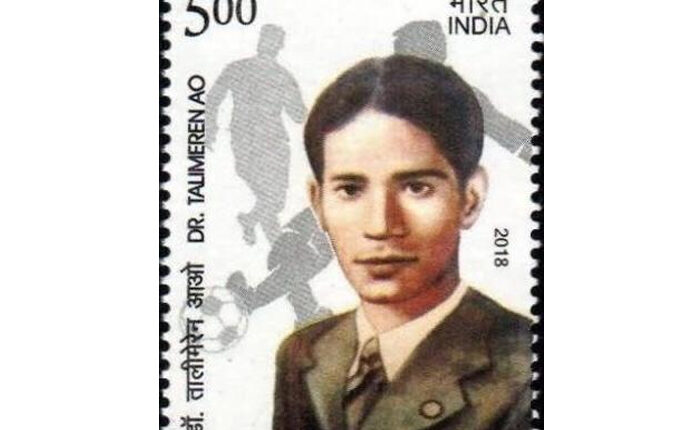Guwahati, July 8 (NKTV): If Providence places you on a fork in the road, would you take the path your heart longs for or would you honour your father’s dreams? Will you turn down glory and gold, for the sake of your people?
In 1918, a boy was born in undivided Assam ( now Nagaland), as 4th of the 12 children to his reverend father. He belonged to one of the tribes of Nagaland.The boy was blessed – he had a knack for both academics and athletics. A nerd and a jock, rolled into one. He played in the fields with footballs made of tightly tied rags.
As he grew up, he joined a missionary school. For the first time in his life, Talimeren Ao, played with a real football. His happiness was brutally cut short – as his father fell ill. Typhoid claimed his father’s life, but the man had a dying wish and told his son, ” I want you to become a doctor”. At that time, no Naga had ever finished MBBS. It wasn’t just a wish of a father, it was the dream of an entire people.
Ao worked hard – on the field and off the field.A nasty blow by an opponent broke his jaw and he was hospitalised for almost a month. Talimeren picked himself up again and worked even harder.
His friend Sarat Das believed in his bones, Ao belonged in a more elite group and took him to Kolkata, where he joined Mohun Bagan. He levelled up his game, but never forgot his father’s dream. In his second attempt, he joined the Carmichael Medical college, Kolkata (now called R.G. Kar college). His father’s dream of having a doctor from the tribe, had been fulfilled, although he was no longer there to see it.
In his third year of MBBS, he had the opportunity to head Indian team in the London Olympics, 1948 as its first Captain. The British principal of Carmichael college, encouraged him and asked him to take as many days leave as he wanted. Young Talimeren Ao, as medical student, flew out of the country. This time, he carried not just the hopes of his tribe, but the dreams of the newly independent India.
They progressed well in Olympics, but unfortunately lost to France 2-1. Sadly his team had to play barefoot. When the press asked him, he didn’t talk about poverty or victimhood. He said, “In my country, we play football. You play boot – ball”. The pithy reply, won the hearts of the British public and the press covered him well.
He was offered a spot in the famed Arsenal team. With it came the promises of a better life in a developed nation and riches. It wasn’t easy to make money in sports those days. Talimeren Ao wasn’t rich. At this critical juncture, he chose his father’s dreams and motherland over the comforts of an Arsenal spot. He politely declined.
He came back to India, completed his MBBS and became the first Naga to prefix the letters “Dr” before his name. One would imagine that such a man would be hailed as a hero by his people – but he was quietly forgotten. Reason : he was playing for India at a time when a struggle for sovereignty of Nagaland was taking root.
He didn’t despair. He hung up his boots at his prime and took up the scalpel instead. He became the medical superintendent of Kohima hospital and operated on patients. When Nagaland attained statehood, he became the first Naga director of health services.
From a boy who couldn’t buy football, to the first Captain of Indian Olympic team, from a helpless son of a dying father, to the first doctor from his tribe – his journey would have been impressive even if two separate people had done it. Dr Talimeren Ao, therefore is doubly impressive – as a sporting legend and a hero of his people. Yet few people know him. To commemorate his birth centenary, Indian government released a stamp. Cotton college indoor stadium is named after him



85909 734233Hey There. I discovered your blog employing msn. That is actually a extremely smartly written article. I will make positive to bookmark it and come back to read much more of your beneficial information. Thanks for the post. I will certainly return. 108577